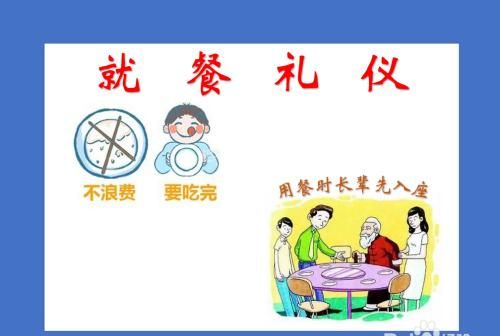本文目录
用餐礼仪用英语怎么说
关于用餐的礼仪英语介绍
不同国家有不同的用餐礼仪!那么我们一起来看看吧!以下是我为您搜集整理提供到的用餐的礼仪英语内容,希望对您有所帮助!欢迎阅读参考学习!

关于用餐的`礼仪英语
Britain(英国)
Always: Eat with your fork in your left hand and knife in your right.
√左手持叉,右手持刀。
Never: Speak with your mouth full.
×说话时嘴里塞满了食物。
Denmark(丹麦)
Always: Place your fork downwards on a plate if you want seconds.
√若要添菜,可将餐叉朝下,置于盘上。
Never: Take the last item on any given plate. You must continue to halve it until only crumbs are left.
×取走盘中最后一份食物。若盘中留下一人份时,可考虑分而食之。
Japan(日本)
Always: Indulge in slurping. It is considered polite.
√吃饭大声咂吧,在日本被视为礼貌之举。
Never: Pour yourself a drink. It is tradition to pour drinks for one another.
×自己倒饮料。食客为彼此倒饮料,才符合传统习俗。
Thailand(泰国)
Always: Consider meals as a social event where only the person perceived as the riches pays.
√饭局其实是个社交场合,最有钱的那个自然会买单。
Never: Leave your chopsticks in the bowl. It symbolises death.
×将筷子插在碗中,那很不吉利。
Mexico(墨西哥)
Always: Wait for your host to say ‘Buen Provecho’ (Enjoy your meal) before eating.
√等主人说完“用餐愉快”(Buen Provecho)后,再开始吃喝。
Never: Arrive on time. Arrive 30 minutes late, if not later.
×准时赴宴。迟到30分钟以上,并不为过。
Middle East(中东)
Always: Eat your meal in silence.
√用餐时保持安静。
Never: Pass food with your left hand.
×用左手递食物。
Germany(德国)
Always: Cut as much food as possible with your fork to compliment the cook that the food is tender.
√取食时,能切多大切多大。在德国,这意在称赞厨师技艺高超,做出的料理入口即化。
Never: Cut lettuce in a salad. Fold it with a fork.
×吃沙拉时切生菜。食客不妨用餐叉叉起食用。
Mongolia(蒙古)
Always: Keep your palm facing up when holding cups.
√持杯时,手掌朝上。
Never: Spill milk or dairy products. It is considered bad luck.
×将牛奶或乳制品洒在地上。蒙古人认为,这会带来厄运。
Kenya(肯尼亚)
Always: Wash your hands before eating: a basin may be brought to the table for you.
√餐前洗手。餐桌上甚至备有洗手盆。
Never: Eat before the eldest male. He must eat first before anyone else can start.
×抢在最老的男性长辈前用餐。要知道,家中最老的男性长辈享有优先用餐权。
Chile(智利)
Always: Let the woman sit down before the men.
√邀请女士先入座。
Never: Speak with cutlery in your hands.
×手持刀叉,与他人交谈。
;英语 餐桌礼仪
英语商务餐桌礼仪
中国人一般都很讲究吃,同时也很讲究吃相。随着职场礼仪越来越被重视,商务饭桌上的吃和吃相也更加讲究。下面我就为大家整理了关于商务餐桌礼仪,让你在餐桌上得心应手。

商务餐桌礼仪【1】
1) As soon as the hostess picks up her napkin, pick yours up and lay it on your lap. Sometimes a roll of bread is wrapped in it; if so, toke it our and put it on your side plate.
2) The Soup CourseDinner usually begins with soup. The largest spoon at your place is the soup spoon. It will be beside your plate at the right-hand side.
3) The Fish CourseIf there is a fish course, it will probably follow the soup. There may be a special fork for the fish, or it may be similar to the meat fork. Often it is smaller
.4) The Meat CourseThe main Course is usually served by the host himself, especially if it is a fowl(鸡禽) or a roast which need to be carved.He will often ask each guest what piece he prefers, and it is quite proper to state your preference as to lean or fat, dark(红肉)or light(白肉).
5) Using Knife and ForkIf you have English and American friends you will notice a few differences in their customs of eating. For the main or meat curse,the English keep the fork in the left hand, point curved downward, and bring the food to the mouth either by sticking the points onto it or in the case of soft vegetables,by placing it firmly on the fork in this position with the knife.Americans carve the meat in the same position, then lay down the knife and taking the fork in the right hand with the point turned up,push it under a small piece of food without the help of the knife and bring it to the moth right-side-up.
6) Helping Yourself and RefusingIf a servant passes food around, he will pass the dish in at your left hand so that you can conveniently serve yourself with your right hand.Never serve yourself while the dish is on your right; it is then the turn of your neighbor on the right. It is polite to take some of everything that is passed to you.But if there is something you may not like, you may quietly say: No thank you.
7) Second HelpingsThe hostess may or may not ask if you would like a second helping, according to the formality of the meal. If she does and you accept it,you should pass your plate to her or to the servant with the knife and fork still lying on it.
8) The Salad CourseA salad is eaten with a fork only held in the right hand with points turned up. There is usually a special one for the salad, a little smaller than the meat fork.
9) Bread and ButterBread is taken in the fingers and laid on the side plate or the edge of the large plate, it is never take with a fork.Butter is taken from the butter dish with the butter knife and placed on the side plate, not on one s bread.
0) Other Things on the TableWhen there are things on the middle of the table, such as bread, butter, jelly, pickles,nits, candies, you should not take any until the hostess ahs suggested that they be passed.
11) Leaving the TableIt is impolite for a guest to leave the table during a meal, or before the hostess gives the signal at the end.When the hostess indicates that the dinner is over, she will start to rise from her seat and all the guests she rise from theirs at the same time.
12) Various rules and SuggestionsSit up straight on your chair;Do not put much food in your mouth at a time;Drink only when there is no food in your mouth;Try not to get into your mouth anything that will have to be taken out;Do not make any nose when you eat;Do not clean your teeth at the table or anywhere in public, either with your finger or a tooth pick(牙签), not even with you tongue.
商务餐桌礼仪【2】
1)座与进餐。此时应听从主人的安排,如邻座是年长者或妇女,应主动协助 他们入座。取菜时,自己食盘内不要盛得太多,如遇本人不能吃或不喜欢的 菜,服务员上菜或主人劝菜时,不要拒绝,可取少量放在盘内,并及时致谢。对不合口味的菜,切勿露出难堪的'表情。吃东西时不要发出声音,要闭嘴嚼,鱼刺、骨头、硬壳等,不要直接外吐,应用筷子取出,(西餐时,吐在叉上)然后放在骨盘内,不要放在桌上。用过的牙签等细小物品最后也都应放进食盘里面。
2)交谈。无论主人还是客人,都应积极参与同桌人的交谈,特别是左右邻座。 不能仅同熟人或只同一两人交谈。邻座如不相识。可先作自我介绍。
3)祝酒。祝酒时不要交叉碰杯。在主人和主宾致辞、祝酒时,其他人应暂停进 外,停止交谈并注意倾听。碰杯时,目光要正对对方以表诚意。另外,主人为了便于工作和进食,还常常采用自助餐的形式来招待客人,吃自助餐时应注意以下礼仪:进餐厅后,先看一圈,对菜点的摆布和服务设施有个了解,这样取菜时可做到心中有数。每种菜点取用时都不要贪多,特别是大家都爱吃的东西更如此,宁可吃完后再取,也勿取满满一盘让人笑话,甚至吃不下造成浪费。取菜时要有秩序,顺序排队取,不要挤在一起取菜。
人多时可礼貌地在一旁等一会儿。取菜点时要依菜点 原来摆放的样子顺序取,不要在盘中翻来找去,这样既不美观,又不礼貌。热菜、 冷食要分开放入自己盘中,切勿堆成一团。取到自己盘在的菜点,即使不爱吃,也绝不能再倒回去,可剩在盘中,放在边桌上,待服务员取走。尽量做到吃什么取什么,吃多少取多少,不够再取,避免浪费。如不小心取多了菜点而没吃完,可待服务员收盘时道声 对不起 。
;关于中国餐桌礼仪的英语句子
1. I will tell you all the things I know about table manners.
2. Do not take your seat till guests and elder people are seated
3. obtain small amount of food each time and do not make loud noise while eating. Take time to talk with neighboring people to create a relaxing atmosphere
4. Upon leaving, give thanks to the host and invite him/her to your house in the future.
5. These are all I know about table manners that you should pay attention to. Hope they are helpful to you.

餐桌礼仪英语短语怎么写
看外国的餐桌礼仪用英文表达的话是如何的呢?你们觉得可以适应吗?下面是我给大家整理的餐桌礼仪 英语 短语 表达,供大家参阅!
餐桌礼仪英语(短语篇)
1) As soon as the hostess picks up her napkin(餐巾), pick yours up and lay it on your lap. Sometimes a roll of bread is wrapped in it; if so, toke it our and put it on your side plate.
2) The Soup Course
Dinner usually begins with soup. The largest spoon at your place is the soup spoon. It will be beside your plate at the right-hand side.
3) The Fish Course
If there is a fish course, it will probably follow the soup. There may be a special fork for the fish, or it may be similar to the meat fork. Often it is smaller.
4) The Meat Course
The main Course is usually served by the host himself, especially if it is a fowl(鸡禽) or a roast which need to be carved. He will often ask each guest what piece he prefers, and it is quite proper to state your preference as to lean or fat, dark(红肉) or light(白肉).
5) Using Knife and Fork
If you have English and American friends you will notice a few differences in their customs of eating. For the main or meat curse, the English keep the fork in the left hand, point curved downward, and bring the food to the mouth either by sticking the points onto it or in the case of soft vegetables, by placing it firmly on the fork in this position with the knife. Americans carve the meat in the same position, then lay down the knife and taking the fork in the right hand with the point turned up, push it under a small piece of food without the help of the knife and bring it to the moth right-side-up.
6) Helping Yourself and Refusing
If a servant passes food around, he will pass the dish in at your left hand so that you can conveniently serve yourself with your right hand. Never serve yourself while the dish is on your right; it is then the turn of your neighbor on the right. It is polite to take some of everything that is passed to you. But if there is something you may not like, you may quietly say: "No thank you."
7) Second Helpings
The hostess may or may not ask if you would like a second helping, according to the formality of the meal. If she does and you accept it, you should pass your plate to her or to the servant with the knife and fork still lying on it.
餐桌礼仪英语(例句篇)
(1)、自己想做某些事情时,用May I ~ ? 想问不知道该不该问的问题时,用May I know?
May I have your name, please?
请问贵姓?
May I have your check out time, please?
请问您什么时候结帐退宿?
May I see your passport, please?
我可以看一下您的护照吗?
(2)、有求于客人时,用Could you ~ ?
Could you fill out the form, please?
请填写这张表格好吗?
Could you write that down, please?
请写下来好吗?
Could you hold the line, please?
请不要挂断电话好吗?
以上这类情况如果用Would you ~ ? 来问,就变成上级对下级说话的口气,带有质问对方的意思,不适合酒店服务人员使用,所以应特别留意。
(3)询问客人的喜好或意愿时,用Would you ~ ?
Would you like tea or coffee?
您要茶还是咖啡?
Would you like to take a taxi?
您需要出租车吗?
Would you mind ~ ing?
您介意 ~ 吗?
下列为“疑问词 + Would you ~ ?”的句型,只能用于询问客人的希望。
When would you like to visit the Jade Buddha Temple?
您什么时候参观玉佛寺?
Where would you like to have lunch?
您想去哪里吃午餐?
What time would you like to eat?
您想要什么时候用餐?
Who would you like to contact?
您想和谁联系?
Why would you like to visit Hong Kong?
您为什么想去香港?
Which kind of room would you prefer?
您喜欢哪一种房型?
Which museum would you like to visit?
您想去参观哪一间博物馆?
How would you like to settle your bill?
您想用什么方式付帐?
How long would you like to stay?
您住多久?
How many tickets would you like to buy?
您要买几张票?
餐桌礼仪英语( 句子 篇)
民以食为天,吃饭是生活中必不可少的一件事。而在家吃饭和在餐厅吃饭会说的话也不同,那么跟吃饭有关的事情用英语怎么说呢?看完这篇 文章 ,相信你对吃饭点餐可以轻车熟路了。
[1] 干杯怎么说
[2] 在家请客招待客人
[3] 在餐厅吃饭的英语
[4] 餐厅英语会话
每逢佳节聚会,英美人常欢聚一堂,频频举杯,开怀畅饮,“干杯!”、“为……干杯!”之声不绝于耳。那么英美人是如何表示的呢?
一、用(Here's)to...表示:
1.Here's to your health / success. 为你的健康 / 成功干杯!
2.Here's to our friendship! 为我们的友谊干杯!
3.Here's to Tom for his new job! 为汤姆的新工作干杯!
二、用health, luck等表示:Good health! Good luck! All the best!例如:
1.Your health, John—May you have a successful time in Manchester!为了你的健康,约翰,也祝你在曼彻斯特前程似锦!
2.Helen raised her glass,“Good luck to you!” she said. 海伦举起酒杯,说道:“祝你好运!”
三、主人或主持人邀客人喝酒时,通常用Cheers! Do the honors!例如:
1.He raised his glass,“May you success! Cheers!” 他举起酒杯说:“祝你成功,干杯!”
2.Pat, you do the honors and propose the toast. 帕特,你敬酒吧。
四、在比较随便的场合,通常用Here's how!还有Happy landing!(美俚,原为空军用语)等。例如:
Oh,come, come,David.Here's how!噢,来呀,来呀,大卫,干杯!
五、在比较正式的场合,英美人有时也用一些外来语。例如:
Prosit!(来源于拉丁语,意为May it do good! To your health/ good luck! etc. )
六、在陈述句中,英美语通常用toast,round, drink to,drink a toast for / to, propose a toast for 等词表示。例如:
1.Friends,I'll give you a toast——to our president! 朋友们,我给大家敬酒,为我们总统干杯!
2.I now propose a toast to the friendship between our two people——to our friendship. 现在,我提议为我们两国人民的友谊干杯!
You would no doubt be interested in Chinese cooking.
你一定喜欢中国菜。
Dinner is ready. Please come to the table.
饭菜好了,请入席。
What would you like to drink?
你要喝什么?
Mr. Taylor, which do you prefer, beer or wine?
Mr. Taylor,你要啤酒还是葡萄酒。
Wouldn't you care for something a little stronger?
你不介意喝点烈酒吧?
Here's to our friendship and to your health, Cheers!
为我们的友谊和您的健康,干杯!
Ah, here come the egg rolls.
Ah,上春卷儿了。
It tastes best when taken piping hot.
趁热吃好吃。
Have some more, please.
请再来点儿。

以上就是关于就餐礼仪英语20条 ,用餐礼仪用英语怎么说的全部内容,以及就餐礼仪英语20条 的相关内容,希望能够帮到您。
